Finding out your electric water heater isn’t working is bad news for everyone in the house. Who doesn’t want a nice, warm shower in the morning to start the day or at night after a long day? A well-working electric water heater is essential for any home in the U.S. today.
Electric water heater problems can be caused by many reasons. Let’s look at these common causes and how you can detect and potentially solve them yourself.
Common Issues and How to Troubleshoot Your Electric Water Heater
The most common issue with an electric water heater is not having the right temperature. With this type of problem, you only need to call a professional if the issue has become more significant.
So DIY diagnostic is an option. Troubleshooting your electric water heater can be a very simple task that can save you money and time! However, please remember to shut off the power to the heater unit before you begin checking on your electric water heater yourself, and don’t work on it if there’s a pool of water near the appliance.
No Hot Water
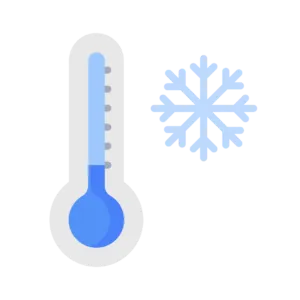
When your electric water heater lacks power or has a problem with the heating element, you’ll get no hot water.
To check if this is the case, go to the water heater’s circuit breaker to see if it has tripped. If it has, reset it by turning it off and on again.
If the breaker is still on, try to reset the high-temperature cutoff. To do this, turn off the circuit breaker to the water heater and then open up the panel, look for the red reset button and press it. If you still don’t have power, the issue might be with the temperature cutoff, which means you need to contact your water heater professional.
The Water Is Too Hot
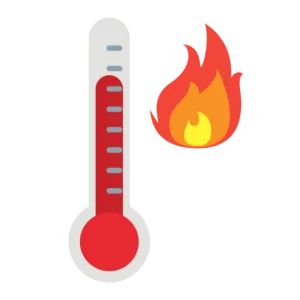 When the water runs too hot, it’s most likely because your water heater’s thermostat is set too high. Another way to troubleshoot your electric water heater is to check the thermostat settings.
When the water runs too hot, it’s most likely because your water heater’s thermostat is set too high. Another way to troubleshoot your electric water heater is to check the thermostat settings.
Turn off the power to the unit and then go on to remove the access panel on your electric water heater. Next, check the heat setting on both the upper and lower thermostats.
The recommended settings for the two thermostats are around 120 degrees Fahrenheit. If it’s too high, you can adjust it down to your desired temperature. Once it’s completed, you can turn the power back on again.
The Water Isn’t Hot Enough
 Are you finding that your water is not hot enough? A way to troubleshoot your electric water heater is checking to see if the cause of inadequate hot water is usually an undersized water heater or broken heating elements.
Are you finding that your water is not hot enough? A way to troubleshoot your electric water heater is checking to see if the cause of inadequate hot water is usually an undersized water heater or broken heating elements.
You need a water heater that can cover all of the household’s hot water needs. If the demand exceeds the capacity, you’ll have inadequate hot water.
However, there are ways you can control your hot water distribution. For example, limiting your time in the shower and doing chores such as dishwashing and laundry at different times. Other ways, such as installing low-flow showerheads and faucets, are also helpful.
If you think your demand is within your water heater’s capacity, then the problem might lie in the heating elements. In this instance, contact your local water heater technician.
When Do You Need To Call A Professional?
You have completed any and all troubleshooting and you still notice an issue. Some problems on your electric water heater are better dealt with by a professional because of their complexity and safety concerns.
The issues below are indications that you need to contact your local water technician as soon as possible. If these issues occur and you are in need of a replacement, it is important to look into what heating systems are going to be the most cost-effective in your home.
The Water Is Discolored And Smells Bad
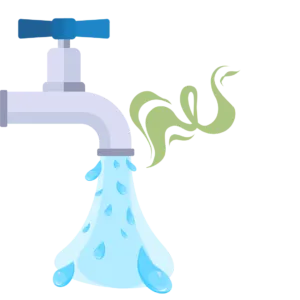 When there’s corrosion inside your tank or a faulty anode rod, the water can come out brownish or yellowish and with a rotten smell. A foul odor can also mean bacteria in your water heater tank, which is obviously troublesome.
When there’s corrosion inside your tank or a faulty anode rod, the water can come out brownish or yellowish and with a rotten smell. A foul odor can also mean bacteria in your water heater tank, which is obviously troublesome.
So in any of these cases, you want to call a professional that can help you figure it out and fix the problem. Typically, replacing the anode rod will solve the problem. However, if the issue turns out to be worse, you may have to buy a new electric water heater.
Leaks
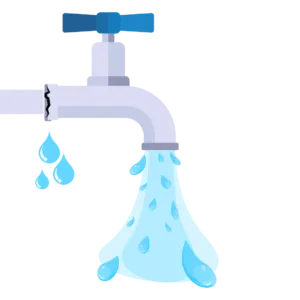 Leaking can be caused by many factors, and you certainly want someone with the expertise to handle it. This is because figuring out the source of the problem requires a good knowledge of this intricate appliance.
Leaking can be caused by many factors, and you certainly want someone with the expertise to handle it. This is because figuring out the source of the problem requires a good knowledge of this intricate appliance.
Causes of leaks can come from excessive pressure, overheating faulty temperature and pressure (T&P) relief valve, a leaking water tank, and many others.
Water Tank Makes Too Much Noise
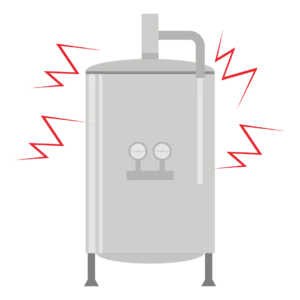 Too much noise from your electric water heater is usually a sign of sediment buildup in the water tank that can cause overheating or boiling of the water.
Too much noise from your electric water heater is usually a sign of sediment buildup in the water tank that can cause overheating or boiling of the water.
You can attempt to fix the problem by draining the tank’s water and getting rid of the sediment. However, if the noise persists or the sediment is too great, you’d want a technician to help you. Your technician can tell you if the issue can be fixed or if a replacement is needed.
End Note
Having a reliable water heater is key to having a comfortable home. Therefore, when there’s a problem with the appliance, it can be a headache to deal with. Troubleshooting your electric water heater can help to fix an issue quickly, but some issues turn out to be bigger than you initially thought.
This is where we come in! We at Johnson’s are here to make you feel at ease by offering to fix any issues you have with your water heater. So don’t hesitate to call us at Johnson’s, “we’re the good guys!”
Johnson’s Heating offers quality services, products, and more! We are the #1 Trane Dealer in Westmoreland County. To learn more about Johnson’s, please make sure to visit us and schedule your free consultation today!

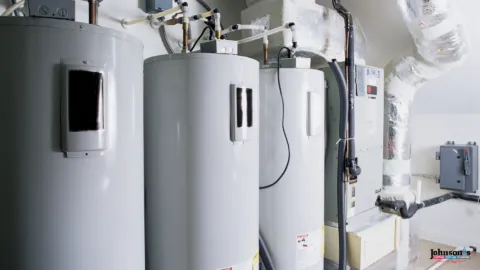
Recent Comments